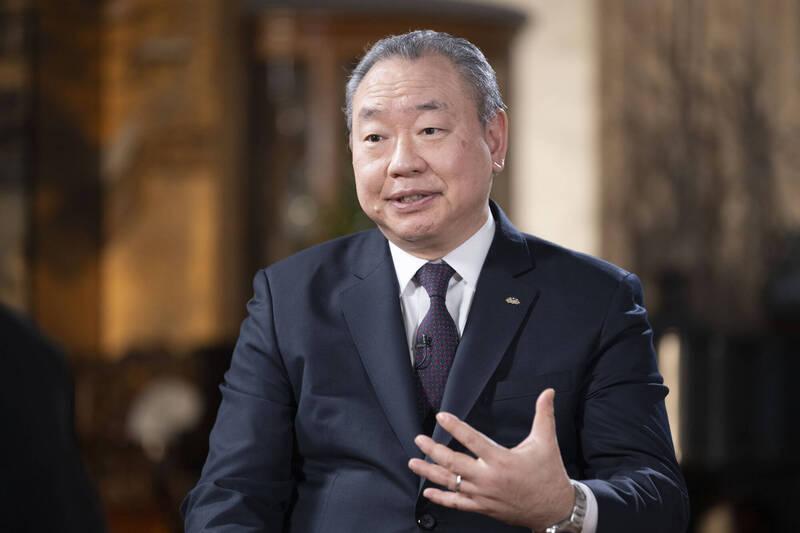Taiwan is not freeloading off the US for its defense against China and that it is taking collaborative steps to bolster its security, Representative to the US Alexander Yui (俞大㵢) said yesterday.
“We’re not freeloaders, free-riders — we’re not just expecting to be saved,” Yui said in an interview yesterday in Washington.

Photo: AP
“Peace through strength is something we embrace,” he added, citing one of US President Donald Trump’s favorite foreign policy taglines.
Yui said Taiwan is in constant discussions with US officials about which US-made weapons it can buy that are best-suited to “asymmetric” warfare against a bigger foe.
Taiwanese officials are also speaking with Silicon Valley defense tech startups, he said.
At the same time, the government in Taipei is “revamping” its military reserves and civil defense preparations, while ensuring its energy grid and food supply can survive any Chinese effort to isolate it, he said.
The comments come as Trump is spurring doubts over US global commitments since returning to the White House.
He is cutting foreign assistance, pushing allies to spend more on their own security and pressuring Ukraine to make concessions to Russia, which invaded it three years ago.
Taiwan is seeking to stay on the right side of Trump, who has questioned the logic of the US' commitment to the security of Taiwan.
The US president has accused Taiwan of taking away the US semiconductor industry.
Bloomberg Economics estimated last year that a war over Taiwan would cost the global economy about US$10 trillion, with the loss of semiconductor manufacturing cascading through global supply chains and markets.
The US president said on the campaign trail that Taiwan should pay the US for its defense, and recently said Taipei should increase its military spending to 10 percent of GDP.
President William Lai (賴清德) last month ruled out such a steep increase, which would put its relative spending far above that of the US and other NATO members, proposing instead a more modest rise to about 3 percent of GDP from about 2.45 percent.
“We’re doing what we can,” Yui said.
He also pitched Taiwan as an “indispensable partner” for Trump’s efforts to revive US manufacturing, with Taiwanese tech firms boosting investment amid threats of tariffs.
Chipmaking behemoth Taiwan Semiconductor Manufacturing Co this month unveiled a new US$100 billion investment in the US — announced at the White House by chief executive officer C.C. Wei (魏哲家) alongside Trump — a deal so big that it spurred criticism the firm was abandoning its home.
The company rejected the allegation, which is particularly sensitive in Taiwan given the “Silicon Shield” theory that Taiwan’s dominant position in the global semiconductor supply chain deters Chinese aggression.
Asked whether Trump’s tariff threats have spurred Taiwan’s investments, Yui acknowledged Washington’s “carrot-and-stick” approach.
He said legislation addressing the double-taxation of Taiwanese firms in the US, which has overwhelmingly passed the House of Representatives, would act as a big incentive for pouring further funds into the US.
Yui said he was “confident” it would clear the Senate and hoped it would be signed into law this year.
“I would rather have the carrot than the stick,” he said.

TRAFFIC SAFETY RULES: A positive result in a drug test would result in a two-year license suspension for the driver and vehicle, and a fine of up to NT$180,000 The Ministry of Transportation and Communications is to authorize police to conduct roadside saliva tests by the end of the year to deter people from driving while under the influence of narcotics, it said yesterday. The ministry last month unveiled a draft of amended regulations governing traffic safety rules and penalties, which included provisions empowering police to conduct mandatory saliva tests on drivers. While currently rules authorize police to use oral fluid testing kits for signs of drug use, they do not establish penalties for noncompliance or operating procedures for officers to follow, the ministry said. The proposed changes to the regulations require

The Executive Yuan yesterday announced that registration for a one-time universal NT$10,000 cash handout to help people in Taiwan survive US tariffs and inflation would start on Nov. 5, with payouts available as early as Nov. 12. Who is eligible for the handout? Registered Taiwanese nationals are eligible, including those born in Taiwan before April 30 next year with a birth certificate. Non-registered nationals with residence permits, foreign permanent residents and foreign spouses of Taiwanese citizens with residence permits also qualify for the handouts. For people who meet the eligibility requirements, but passed away between yesterday and April 30 next year, surviving family members

China Airlines Ltd (CAL) yesterday morning joined SkyTeam’s Aviation Challenge for the fourth time, operating a demonstration flight for “net zero carbon emissions” from Taiwan Taoyuan International Airport to Bangkok. The flight used sustainable aviation fuel (SAF) at a ratio of up to 40 percent, the highest proportion CAL has achieved to date, the nation’s largest carrier said. Since April, SAF has become available to Taiwanese international carriers at Taipei International Airport (Songshan airport), Kaohsiung International Airport and Taoyuan airport. In previous challenges, CAL operated “net zero carbon emission flights” to Singapore and Japan. At a ceremony at Taoyuan airport, China Airlines chief sustainability

‘ONE CHINA’: A statement that Berlin decides its own China policy did not seem to sit well with Beijing, which offered only one meeting with the German official German Minister for Foreign Affairs Johann Wadephul’s trip to China has been canceled, a spokesperson for his ministry said yesterday, amid rising tensions between the two nations, including over Taiwan. Wadephul had planned to address Chinese curbs on rare earths during his visit, but his comments about Berlin deciding on the “design” of its “one China” policy ahead of the trip appear to have rankled China. Asked about Wadephul’s comments, Chinese Ministry of Foreign Affairs spokesman Guo Jiakun (郭嘉昆) said the “one China principle” has “no room for any self-definition.” In the interview published on Thursday, Wadephul said he would urge China to